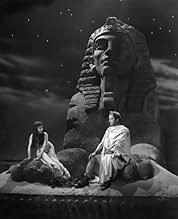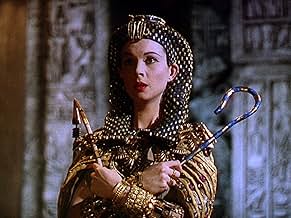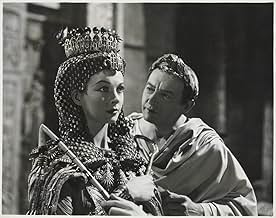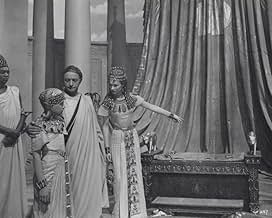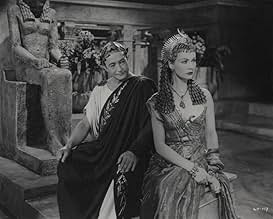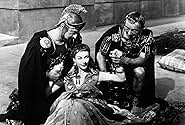IMDb रेटिंग
6.2/10
3.3 हज़ार
आपकी रेटिंग
अपनी भाषा में प्लॉट जोड़ेंAt the height of the Roman Civil War, a young Cleopatra (Vivien Leigh) meets a middle-aged Julius Caesar (Claude Rains), who teaches her how to rule Egypt.At the height of the Roman Civil War, a young Cleopatra (Vivien Leigh) meets a middle-aged Julius Caesar (Claude Rains), who teaches her how to rule Egypt.At the height of the Roman Civil War, a young Cleopatra (Vivien Leigh) meets a middle-aged Julius Caesar (Claude Rains), who teaches her how to rule Egypt.
- 1 ऑस्कर के लिए नामांकित
- 2 कुल नामांकन
Anthony Eustrel
- Achillas
- (as Antony Eustrel)
James McKechnie
- 2nd. Centurion
- (as James Mc Kechnie)
फ़ीचर्ड समीक्षाएं
Cleopatra and Julius Caesar carry on an arch flirtation, while spouting epigrams courtesy of George Bernard Shaw, in this literate, exuberant and thoroughly enjoyable movie. "Caesar and Cleopatra" stands out against the typical British production, which tends to be drab and morose. (Other notable exceptions are the works of Pressberger & Powell, the Korda brothers and Olivier.)
Claude Rains is perfectly cast as the cynical, world-weary and "ready for the knife" Julius Caesar. I'm not sure if it's makeup, or perhaps lighting, but Rains's face looks like it was taken from one of those memorial portraits in the Roman catacombs. In any case, while it may be Caesar's countenance we see, it's Shaw's voice we hear. I love Claude Rains in everything, but there's an intimacy with Rains here that makes "Caesar and Cleopatra" one of my Rains favorites.
And Vivian Leigh. What can I say? Her Cleopatra is Scarlett O'Hara, except that while Scarlett's flirtations were matters of the heart, Cleopatra's were purely matters of state. In the beginning Cleopatra is a sheltered, naive...well, princess. By the end, she has learned well at Caesar's knee and possesses the ruthlessness and guile of statecraft - she is a queen.
Another delight is Stewart Granger's swashbuckling Apollodorus, and Flora Robson has a delicious part as Cleopatra's nursemaid Ftatateeta. Robson is well qualified as a tutor of royalty, having herself played Queen Elizabeth in "Fire over England".
Like another classic British spectacle, "The Four Feathers," "Caesar and Cleopatra" is one of the treasures in my film archive which I view repeatedly alone.
Claude Rains is perfectly cast as the cynical, world-weary and "ready for the knife" Julius Caesar. I'm not sure if it's makeup, or perhaps lighting, but Rains's face looks like it was taken from one of those memorial portraits in the Roman catacombs. In any case, while it may be Caesar's countenance we see, it's Shaw's voice we hear. I love Claude Rains in everything, but there's an intimacy with Rains here that makes "Caesar and Cleopatra" one of my Rains favorites.
And Vivian Leigh. What can I say? Her Cleopatra is Scarlett O'Hara, except that while Scarlett's flirtations were matters of the heart, Cleopatra's were purely matters of state. In the beginning Cleopatra is a sheltered, naive...well, princess. By the end, she has learned well at Caesar's knee and possesses the ruthlessness and guile of statecraft - she is a queen.
Another delight is Stewart Granger's swashbuckling Apollodorus, and Flora Robson has a delicious part as Cleopatra's nursemaid Ftatateeta. Robson is well qualified as a tutor of royalty, having herself played Queen Elizabeth in "Fire over England".
Like another classic British spectacle, "The Four Feathers," "Caesar and Cleopatra" is one of the treasures in my film archive which I view repeatedly alone.
Shaw's hardly a speck on the windshield of American cultural consciousness anymore. Too bad. "The Devil's Disciple," "Major Barbara," "Arms and the Man," "Candida," "You Never Can Tell." Witty, clever, insightful, intriguing... a century and more later.
For those who haven't discovered him yet, this colorful, fast-paced rendition of "C&C" makes a nifty portal. The film -looks- like "Quo Vadis" or "Samson and Delilah" (of more or less the same vintage). It even looks like the Taylor-Burton-Harrison marathon done almost two decades later.
But it doesn't -feel- like -any- of those. Shaw always had a great story to tell -- and a something worthwhile to -say- -- and he (or his characters) almost invariably told and said it well. One could hardly call the 1934 or 1963 films "insightful romps." This, however...
I've been a sucker for Vivien Leigh since I watched her whip the boys into shape in "GWTW," but as interesting as she was there, she's miles beyond Scarlet O'Hara here. Shaw gave -his- Cleo a far more complex character than Young or Mankiewicz gave their Cleo's; this alabaster Leigh is both adolescent and guileful. But to Rains's conflicted but self-suspect Caesar, she's about as transparent as that look-alike, late-night, hottie-cum-biblical-scholar who inherited Gene Scott's TV ministry.
The relationships here are no different from those in the Mankiewicz mess, but they move along in far more sophisticated -- and entertaining -- fashion here. We already know the resolution, it's the unfolding of the drama that matters.
Rains ("Casablanca," "The Invisible Man") and Leigh bring the wise, amused, self-effacing old man and the desperate, manipulative, narcissistic young woman in Shaw's play far more credibly to life than was the case in the DeMille or Manciewicz films. And supporters like Robson, Granger and the rest add plenty. But as in any Shaw play, it's the playwright's sophisticated revelations that matter.
The "big success" narcissist who thinks a "trophy wife" is a good idea might learn plenty from a trip to Blockbuster and a two-dollar investment.
For those who haven't discovered him yet, this colorful, fast-paced rendition of "C&C" makes a nifty portal. The film -looks- like "Quo Vadis" or "Samson and Delilah" (of more or less the same vintage). It even looks like the Taylor-Burton-Harrison marathon done almost two decades later.
But it doesn't -feel- like -any- of those. Shaw always had a great story to tell -- and a something worthwhile to -say- -- and he (or his characters) almost invariably told and said it well. One could hardly call the 1934 or 1963 films "insightful romps." This, however...
I've been a sucker for Vivien Leigh since I watched her whip the boys into shape in "GWTW," but as interesting as she was there, she's miles beyond Scarlet O'Hara here. Shaw gave -his- Cleo a far more complex character than Young or Mankiewicz gave their Cleo's; this alabaster Leigh is both adolescent and guileful. But to Rains's conflicted but self-suspect Caesar, she's about as transparent as that look-alike, late-night, hottie-cum-biblical-scholar who inherited Gene Scott's TV ministry.
The relationships here are no different from those in the Mankiewicz mess, but they move along in far more sophisticated -- and entertaining -- fashion here. We already know the resolution, it's the unfolding of the drama that matters.
Rains ("Casablanca," "The Invisible Man") and Leigh bring the wise, amused, self-effacing old man and the desperate, manipulative, narcissistic young woman in Shaw's play far more credibly to life than was the case in the DeMille or Manciewicz films. And supporters like Robson, Granger and the rest add plenty. But as in any Shaw play, it's the playwright's sophisticated revelations that matter.
The "big success" narcissist who thinks a "trophy wife" is a good idea might learn plenty from a trip to Blockbuster and a two-dollar investment.
Up to the time it was released in 1945 Caesar and Cleopatra was the most expensive British film ever made. It was as though the British cinema was trying to show America it could do a DeMille like epic as good as Cecil B. DeMille or anyone else from Hollywood. It may have been a little too overdone. Director Gabriel Pascal might have gotten a bit carried away with the spectacle and the audience might well have missed some of George Bernard Shaw's inspired dialog.
And Pascal had the advantage of the aged Mr. Shaw personally supervising the production. Of course Shaw insisted on total fidelity to his play and the ideas therein. I understand that J. Arthur Rank wanted to have a little sex and romance in there, like DeMille did do, but Shaw would have none of it.
What sets Caesar and Cleopatra apart from other Cleopatra stories that starred Theda Bara, Elizabeth Taylor, and Claudette Colbert is that Shaw portrayed her as probably what she was, a silly teenager who just happens to be Queen of Egypt. There's a little bit of Scarlett O'Hara in Vivien Leigh's performance as she moves from silly teen to a young women well schooled in statecraft by Julius Caesar.
Claude Rains plays a world weary Julius Caesar and the Shavian quips roll off his tongue with great aplomb. Like George Bernard Shaw's other masterpiece Pygmalion, Rains tutors Leigh and the results far exceed what he could have hoped for.
Production on Caesar and Cleopatra was begun while there was still a shooting war in Europe and V-2s and other such explosive devices were still raining down on the United Kingdom. A couple came real close to the studio in London this was being filmed at.
Stewart Granger got his first real notice in this film playing Apollodorus and Francis L. Sullivan plays a blustering and plotting Pothinos. If you look hard among the various slave women you will find both Jean Simmons and Kay Kendall among the extras.
You will also like both Basil Sydney as Ruffio and Cecil Parker as Britanus, two aides to Caesar who both occasionally give him a reality check.
Caesar and Cleopatra failed to recoup the cost of making it in initial release. J. Arthur Rank misjudged the British public taste post World War II. Maybe a little less expense and more attention to Shaw's words and the film might have been better.
Still it's pretty good as is.
And Pascal had the advantage of the aged Mr. Shaw personally supervising the production. Of course Shaw insisted on total fidelity to his play and the ideas therein. I understand that J. Arthur Rank wanted to have a little sex and romance in there, like DeMille did do, but Shaw would have none of it.
What sets Caesar and Cleopatra apart from other Cleopatra stories that starred Theda Bara, Elizabeth Taylor, and Claudette Colbert is that Shaw portrayed her as probably what she was, a silly teenager who just happens to be Queen of Egypt. There's a little bit of Scarlett O'Hara in Vivien Leigh's performance as she moves from silly teen to a young women well schooled in statecraft by Julius Caesar.
Claude Rains plays a world weary Julius Caesar and the Shavian quips roll off his tongue with great aplomb. Like George Bernard Shaw's other masterpiece Pygmalion, Rains tutors Leigh and the results far exceed what he could have hoped for.
Production on Caesar and Cleopatra was begun while there was still a shooting war in Europe and V-2s and other such explosive devices were still raining down on the United Kingdom. A couple came real close to the studio in London this was being filmed at.
Stewart Granger got his first real notice in this film playing Apollodorus and Francis L. Sullivan plays a blustering and plotting Pothinos. If you look hard among the various slave women you will find both Jean Simmons and Kay Kendall among the extras.
You will also like both Basil Sydney as Ruffio and Cecil Parker as Britanus, two aides to Caesar who both occasionally give him a reality check.
Caesar and Cleopatra failed to recoup the cost of making it in initial release. J. Arthur Rank misjudged the British public taste post World War II. Maybe a little less expense and more attention to Shaw's words and the film might have been better.
Still it's pretty good as is.
Impressive acting is the highlight of 1945's "Caesar and Cleopatra," a British production starring Vivien Leigh, Claude Rains, Stewart Granger, Flora Robson and Francis L. Sullivan. In smaller roles, you can spot Michael Rennie, Kay Kendall and Jean Simmons.
This production was not without its problems - made during World War II, bombings often delayed the filming; there was a five-week break while Vivien Leigh recovered from a miscarriage; and there was a shortage of materials to build the sets. Nevertheless, for a British film, this is a real spectacle and made in color, which was also unusual back then.
Shaw's Cleopatra (Leigh) is a childlike girl/woman who has hitting matches with her younger brother, runs, giggles, talks fast and becomes nervous at the thought of meeting the great Caesar (Rains). In the beginning, she meets him without realizing it. The two have a flirtation while he teaches her how to be a queen. Shaw's Caesar is an old man, a great warrior and a benevolent ruler who rules with a velvet glove rather than a sword.
Rains and Leigh are wonderful in their roles. Rains, as someone stated, with his Caesar haircut, weary face and beautiful profile looks as if he stepped out of that time period. His mastery of Shaw's language is magnificent, and he really holds the film together.
The stunningly beautiful Leigh, white-faced with glorious cheekbones and dazzling eyes, is a whimsical Cleopatra at first. She matures and becomes calmer and more regal as she learns how to be a queen, but she falls back into her childish ways in the presence of Caesar, particularly when he promises to send her Marc Anthony.
They say the camera adds 10 pounds - frankly, I'm surprised any of the actors could see Leigh, she is so tiny. She gives a sprightly, energetic performance. Shaw's Cleopatra is 16 (though in reality she is 20 or 21) - Leigh was 32 at the time of filming and comes off like the teenager Shaw wrote.
Stewart Granger as Apollodorus shows off his very hunky physique - no wonder he came to the attention of Hollywood. As two aides of Caesar's, Basil Sydney as Ruffio and Cecil Parker as Britanus give fine performances. Finally, Flora Robson as the protective, tough nursemaid of Cleopatra's, Ftatateeta, sinks her teeth into the role and is a force to contend with.
This movie flopped, probably because audiences thought it was going to be some huge spectacle - it's big for England, but it's not DeMille. Still, it's a real treat to see one of the classics done by two great actors who were well-trained and well-equipped to perform George Bernard Shaw.
This production was not without its problems - made during World War II, bombings often delayed the filming; there was a five-week break while Vivien Leigh recovered from a miscarriage; and there was a shortage of materials to build the sets. Nevertheless, for a British film, this is a real spectacle and made in color, which was also unusual back then.
Shaw's Cleopatra (Leigh) is a childlike girl/woman who has hitting matches with her younger brother, runs, giggles, talks fast and becomes nervous at the thought of meeting the great Caesar (Rains). In the beginning, she meets him without realizing it. The two have a flirtation while he teaches her how to be a queen. Shaw's Caesar is an old man, a great warrior and a benevolent ruler who rules with a velvet glove rather than a sword.
Rains and Leigh are wonderful in their roles. Rains, as someone stated, with his Caesar haircut, weary face and beautiful profile looks as if he stepped out of that time period. His mastery of Shaw's language is magnificent, and he really holds the film together.
The stunningly beautiful Leigh, white-faced with glorious cheekbones and dazzling eyes, is a whimsical Cleopatra at first. She matures and becomes calmer and more regal as she learns how to be a queen, but she falls back into her childish ways in the presence of Caesar, particularly when he promises to send her Marc Anthony.
They say the camera adds 10 pounds - frankly, I'm surprised any of the actors could see Leigh, she is so tiny. She gives a sprightly, energetic performance. Shaw's Cleopatra is 16 (though in reality she is 20 or 21) - Leigh was 32 at the time of filming and comes off like the teenager Shaw wrote.
Stewart Granger as Apollodorus shows off his very hunky physique - no wonder he came to the attention of Hollywood. As two aides of Caesar's, Basil Sydney as Ruffio and Cecil Parker as Britanus give fine performances. Finally, Flora Robson as the protective, tough nursemaid of Cleopatra's, Ftatateeta, sinks her teeth into the role and is a force to contend with.
This movie flopped, probably because audiences thought it was going to be some huge spectacle - it's big for England, but it's not DeMille. Still, it's a real treat to see one of the classics done by two great actors who were well-trained and well-equipped to perform George Bernard Shaw.
CAESAR AND CLEOPATRA (1945), based on George Bernard Shaw's play and directed by Gabriel Pascal, is a very unique movie that combines all precious aspects of film art. It is not purely a historical movie since it contains a lot of inaccuracies that appear to be illogical from a historical perspective. Nevertheless, one has to analyze it in a deeper understanding, taking into account other factors that make the film a precious piece of post-war cinema. Therefore, it is impossible to see it without the consideration of other aspects, or more clearly, other figures that significantly affect the movie in general: George Bernard Shaw with his style filled with wit and elegance; and Vivien Leigh with her extraordinary acting skills. Let me consider the three aforementioned aspects: history, Shaw and Leigh.
HISTORY: It is true that if you know Cleopatra's story and the events connected with the Roman conquest over Egypt, you will feel confused or even disappointed with the content of this film. Cleopatra definitely did not learn to be a queen from Caesar that much as she does here. She was a very intelligent woman with "foxy" plans as for Caesar and Rome(in this case, I would recommend CLEOPATRA by DeMille (1934) or by Mankiewicz (1963). The film by Pascal presents, in part justifiably, a total mess in Egypt that Caesar finds when he steps into its politics. This is proved by the way Cleopatra and her brother Ptolemy are showed - two kids rather than rulers who compete for power. However, there are some strong historical points in the film that must be seen together with shortcomings. First, the film very well presents the Romans together with their leader Julius Caesar wonderfully played by Claude Rains. There is a very realistic scene of Roman legions entering Alexandria, the capital of Egypt. I also liked the way Caesar's personality is developed - someone who is full of contradictions rather than an "almighty" conqueror. These aspects make the film more authentic and ancient heroes more humane. However, it cannot be treated as a historical work for sure.
GEORGE BERNARD SHAW: But all must be thanked not only to the director but to this great classic playwright. G.B. Shaw is noticeable throughout, particularly through magnificent elegance. The director, Gabriel Pascal, really retains everything that one can find in Shaw's play. Therefore, any Shaw's fan, including the one with richest imagination will not be disappointed thanks to the marvelous elegance in this movie. In other words, the pictures of the film will not leave anything else to wish. The lavish sets, the costumes, simply BEAUTY noticeable in most of the scenes! Wit is another aspect. This is most effective in the scenes with Caesar and Cleopatra. "You will soon learn how to govern" says Cleopatra to mighty Caesar after a day or two of his lessons of ruling. Or the jumps into the sea (Apollodorus, Caesar and .... Cleopatra) - quite unique!
VIVIEN LEIGH: Before seeing the film, I did not expect her to be as good as her Scarlett O'Hara in GONE WITH THE WIND (1939). Now I must say that she is better as Cleopatra. Vivien gives a marvelous performance as a girl dreaming of a handsome man with strong arms who could protect her, and as a girl who later changes into a courageous, mighty queen. "If one man in all Alexandria can be found to say I did wrong, I swear to have myself be crucified on the door of the palace by my own slaves," which she says to Caesar after ordering Pothinus to be killed. And how wonderfully she plays one of the first scenes when she, in very unpredictable circumstances, finds out that the stranger she met at the Sphynx and with whom she talked so trust-worthily, is Caesar himself. UNFORGETTABLE! A lot of people associate only Liz Taylor with film Cleopatra. Not to mention Claudette Colbert, it is a pity they don't find Leigh's performance as worth highest attention.
It would be unfair to skip one more factor: other cast. Vivien shines in her role but others do very good jobs as well. Claude Rains is a very different Caesar than in most other films (actors who played him were, among others, Rex Harrison, William Warren, Fritz Leibner). But he is unforgettable, his face reflects a spirit of antiquity. Flora Robson who gives a memorable performance of Cleopatra's bossy servant Ftatateeta, stresses rather male features of character. She does it wonderfully through her gestures and low voice. And Francis L Sullivan as Pothinus - really worth attention!
All in all, there are many other aspects that make the movie highly recommended. Of course, it is difficult to mention everything in one review. All I can say at the end of my review is:
Do see the film!
If you are Shaw's fan, you will find his spirit throughout.
If you are Vivien Leigh's fan, you will be absolutely amazed by her performance.
If you are fond of historical, lavish epics, there will definitely be something wonderful that you will appreciate in CAESAR AND CLEOPATRA. 8/10!
HISTORY: It is true that if you know Cleopatra's story and the events connected with the Roman conquest over Egypt, you will feel confused or even disappointed with the content of this film. Cleopatra definitely did not learn to be a queen from Caesar that much as she does here. She was a very intelligent woman with "foxy" plans as for Caesar and Rome(in this case, I would recommend CLEOPATRA by DeMille (1934) or by Mankiewicz (1963). The film by Pascal presents, in part justifiably, a total mess in Egypt that Caesar finds when he steps into its politics. This is proved by the way Cleopatra and her brother Ptolemy are showed - two kids rather than rulers who compete for power. However, there are some strong historical points in the film that must be seen together with shortcomings. First, the film very well presents the Romans together with their leader Julius Caesar wonderfully played by Claude Rains. There is a very realistic scene of Roman legions entering Alexandria, the capital of Egypt. I also liked the way Caesar's personality is developed - someone who is full of contradictions rather than an "almighty" conqueror. These aspects make the film more authentic and ancient heroes more humane. However, it cannot be treated as a historical work for sure.
GEORGE BERNARD SHAW: But all must be thanked not only to the director but to this great classic playwright. G.B. Shaw is noticeable throughout, particularly through magnificent elegance. The director, Gabriel Pascal, really retains everything that one can find in Shaw's play. Therefore, any Shaw's fan, including the one with richest imagination will not be disappointed thanks to the marvelous elegance in this movie. In other words, the pictures of the film will not leave anything else to wish. The lavish sets, the costumes, simply BEAUTY noticeable in most of the scenes! Wit is another aspect. This is most effective in the scenes with Caesar and Cleopatra. "You will soon learn how to govern" says Cleopatra to mighty Caesar after a day or two of his lessons of ruling. Or the jumps into the sea (Apollodorus, Caesar and .... Cleopatra) - quite unique!
VIVIEN LEIGH: Before seeing the film, I did not expect her to be as good as her Scarlett O'Hara in GONE WITH THE WIND (1939). Now I must say that she is better as Cleopatra. Vivien gives a marvelous performance as a girl dreaming of a handsome man with strong arms who could protect her, and as a girl who later changes into a courageous, mighty queen. "If one man in all Alexandria can be found to say I did wrong, I swear to have myself be crucified on the door of the palace by my own slaves," which she says to Caesar after ordering Pothinus to be killed. And how wonderfully she plays one of the first scenes when she, in very unpredictable circumstances, finds out that the stranger she met at the Sphynx and with whom she talked so trust-worthily, is Caesar himself. UNFORGETTABLE! A lot of people associate only Liz Taylor with film Cleopatra. Not to mention Claudette Colbert, it is a pity they don't find Leigh's performance as worth highest attention.
It would be unfair to skip one more factor: other cast. Vivien shines in her role but others do very good jobs as well. Claude Rains is a very different Caesar than in most other films (actors who played him were, among others, Rex Harrison, William Warren, Fritz Leibner). But he is unforgettable, his face reflects a spirit of antiquity. Flora Robson who gives a memorable performance of Cleopatra's bossy servant Ftatateeta, stresses rather male features of character. She does it wonderfully through her gestures and low voice. And Francis L Sullivan as Pothinus - really worth attention!
All in all, there are many other aspects that make the movie highly recommended. Of course, it is difficult to mention everything in one review. All I can say at the end of my review is:
Do see the film!
If you are Shaw's fan, you will find his spirit throughout.
If you are Vivien Leigh's fan, you will be absolutely amazed by her performance.
If you are fond of historical, lavish epics, there will definitely be something wonderful that you will appreciate in CAESAR AND CLEOPATRA. 8/10!
क्या आपको पता है
- ट्रिवियाThe role of Caesar originally was offered to Sir John Gielgud, who turned it down because he detested Director Gabriel Pascal.
- गूफ़Caesar refers to his nose as "rather long" and "a Roman nose," but the idea of a "Roman nose" was not introduced until almost 150 years later, when the Emperor Hadrian erected statues of his favorite, Antinous, throughout the Empire (where many of the people had never seen a Roman), and Antinous's long nose was taken as typical of Romans (even though Antinous was a Greek).
- भाव
Julius Caesar: And so to the end of history, murder shall breed murder, always in the name of right, and justice, and peace, until the gods create a race of men that can understand.
- क्रेज़ी क्रेडिटClosing credits cast list finishes with And The Crowd.
- कनेक्शनFeatured in Great Performances: Laurence Olivier: A Life (1983)
टॉप पसंद
रेटिंग देने के लिए साइन-इन करें और वैयक्तिकृत सुझावों के लिए वॉचलिस्ट करें
- How long is Caesar and Cleopatra?Alexa द्वारा संचालित
विवरण
बॉक्स ऑफ़िस
- बजट
- £12,78,000(अनुमानित)
- चलने की अवधि2 घंटे 18 मिनट
- पक्ष अनुपात
- 1.37 : 1
इस पेज में योगदान दें
किसी बदलाव का सुझाव दें या अनुपलब्ध कॉन्टेंट जोड़ें



